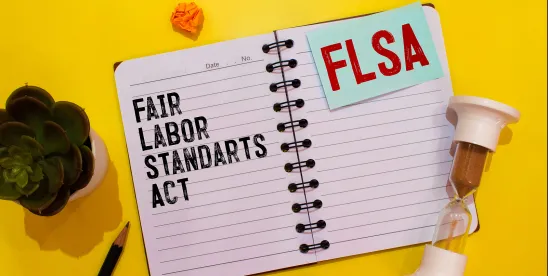On August 16, 2024, the Seventh Circuit Court of Appeals weighed in on whether out-of-state plaintiffs must satisfy personal jurisdiction requirements to participate in a collective action under the Fair Labor Standards Act (FLSA). In a 2–1 decision, the Seventh Circuit held they must, joining the Third, Sixth, and Eighth Circuit Courts of Appeals and rejecting the First Circuit Court of Appeals’ position.
Quick Hits
- On August 16, 2024, the Seventh Circuit held that opt-in plaintiffs must each satisfy personal jurisdiction requirements to participate in FLSA collective actions.
- The Seventh Circuit joined the Third, Sixth, and Eighth Circuits and rejected the First Circuit’s ruling on personal jurisdiction with respect to the claims of prospective opt-in plaintiffs in FLSA collective actions.
- The Seventh Circuit held that “a court must establish its jurisdiction over claims one at a time.” “The FLSA does not mark an exception to that rule, and neither does any loophole in Rule.”
For out-of-state defendants haled into court outside their home states, this question is often raised at the conditional certification stage: Can the court conditionally certify a nationwide collective if only a portion of the putative collective worked for the defendant in that state? The question gained momentum after the Supreme Court of the United States’ decision in Bristol-Myers Squibb Co. v. Superior Court of California,with district courts reaching different holdings on the issue. District courts in the Seventh Circuit have historically remained silent, finding it premature to decide the issue at the conditional certification stage. The silence ends now as the Seventh Circuit, in Luna Vanegas v. Signet Builders, Inc., officially joins the Third, Sixth, and Eighth Circuit Courts of Appeals in holding a court must have personal jurisdiction over each and every opt-in plaintiff.
Background
Signet Builders, Inc., is incorporated and headquartered in Texas, but it conducts business nationwide. Part of Signet’s business includes constructing livestock housing in Wisconsin. Jose Ageo Luna Vanegas was an employee who constructed livestock housing in Wisconsin. In 2021, Luna Vanegas sued Signet in the U.S. District Court for the Western District of Wisconsin, alleging he and other similarly situated employees were not paid overtime in violation of the FLSA.
Following a complicated legal battle, Luna Vanegas moved for conditional certification, which would allow him to provide notice of the lawsuit to Signet employees nationwide. Signet opposed the motion, arguing that under Bristol-Myers the court lacked personal jurisdiction over employees who worked outside Wisconsin. The court declined to hear the jurisdictional question, holding it “should wait for another day, after the court saw how many out-of-state members opted in.” Signet moved for interlocutory appeal, which the district court granted, and the Seventh Circuit accepted.
The Significance of Bristol-Myers
Bristol-Myers involved a mass tort action under state law for alleged defects in a blood thinner drug the company manufactured. Residents and nonresidents of California sued Bristol-Myers in California state court. Bristol-Myers, which is incorporated in Delaware and headquartered in New York, argued the court lacked specific personal jurisdiction over the nonresidents’ claims. The Supreme Court agreed, finding the nonresident plaintiffs did not claim any relationship with the forum state because they did not purchase the drug in California or suffer any resulting harm in California. The Supreme Court, based on its own precedent, stated that “‘a defendant’s relationship with a … third party, standing alone, is an insufficient basis for jurisdiction.’” The Court further explained that “[w]hen no such connection exists, specific jurisdiction is lacking regardless of the extent of a defendant’s unconnected activities in the [s]tate.”
In ruling that the California state court lacked jurisdiction over the nonresident plaintiffs’ claims, the Supreme Court recognized that its holding might generate more litigation in the form of separate actions by nonresident plaintiffs in their respective states. But the Supreme Court also noted that all plaintiffs to the action could have brought a mass tort action against Bristol-Myers in a state that had general jurisdiction—i.e., Delaware or New York.
While the Supreme Court’s jurisdictional analysis in Bristol-Myers invoked the Fourteenth Amendment’s Due Process Clause, the Supreme Court left open the question of whether the same analysis applied under the Fifth Amendment.
Circuits Are Split Over the Application of Bristol-Myers to FLSA Cases
In the wake of Bristol-Myers, courts differed on whether the same jurisdictional analysis applied to federal claims, like those brought under the FLSA. Those in favor—which include the Third Circuit, Sixth Circuit, and Eighth Circuit—often relied on a traditional due process analysis under the Fourteenth Amendment of the U.S. Constitution, noting that if Congress intended to allow nationwide service of process under the FLSA it could have so written, just as it did for many other acts (like the Clayton Act, Sherman Act, and Securities Exchange Act, to name a few). In the absence of such a provision—as the Seventh Circuit explained—federal courts are bound by the jurisdictional limits of Federal Rule of Civil Procedure 4(k)(1)(A), “which in turn pulls in state law limitations on jurisdiction.” Those limitations often—though not always—defer to the limits established by the U.S. Constitution (i.e., the Fourteenth Amendment).
Those who oppose—which includes the First Circuit—often assert the Fourteenth Amendment cannot restrict a federal court from hearing a federal claim—only the Fifth Amendment can limit a federal court. Nor do they believe Rule 4(k)(1)(A) limits the jurisdiction of opt-in plaintiffs, since the only person who is required to serve summons on the defendant under Rule 4 is the named plaintiff.
The Seventh Circuit’s Analysis
In Luna Vanegas v. Signet Builders, Inc., the majority opinion began by noting the similarities between the mass action in Bristol-Myers and an FLSA collective action: both are consolidated suits comprised of individual cases brought by individual plaintiffs that are litigated in tandem. This differs significantly from representative class actions under Rule 23, which are brought by named plaintiff(s) who represent the class (sometimes called absentee plaintiffs) in litigating a common claim.
The difference is meaningful since “‘absent class members are not full parties to the case for many purposes,’ including personal jurisdiction.” Further, plaintiffs who wish to lead a Rule 23 class action must earn the right to do so by satisfying the rigorous standards of Rule 23, thus confirming they “will well represent the absentee[]” plaintiffs. The same cannot be said of collective actions. Rather, in collective actions, “each FLSA claimant has the right to be present in court to advance his or her own claim,” is subject to individual tolling of the statute of limitations on his or her claim, and may assert “individualized claims and individualized defenses,” among other key differences.
Because an FLSA collective action is not like a representative action, an opt-in plaintiff may not rely on the named plaintiff to establish jurisdiction. Instead, the majority held Bristol-Myers requires each plaintiff to establish personal jurisdiction on an individual basis. Since the FLSA does not contain a jurisdictional provision allowing nationwide reach, federal courts are left with the jurisdictional limits established by Rule 4(k)(1)(A), which point to the state’s limits on jurisdiction. Thus “[t]he Fourteenth Amendment, not the Fifth, does all the jurisdictional work in this case.”
Judge Ilana Rovner dissented, primarily on the ground that the majority opinion diminished the broader FLSA goals of worker protection and efficiency in collective actions. Judge Rovner argued that the Seventh Circuit’s holding might force workers to file splintered suits in jurisdictions where they face greater hurdles, thus increasing litigation costs and decreasing judicial efficiency—an observation that other courts have also made.
Key Takeaways
Luna Vanegas will significantly limit the size and geographic scope of FLSA collective actions in the Seventh Circuit, absent a district court’s exercise of general jurisdiction over a corporate defendant. The Seventh Circuit’s decision in Luna Vanegas creates further potential for piecemeal litigation nationwide. Federal appellate courts remain split on this issue, making it ripe for review by the Supreme Court.






 />i
/>i

